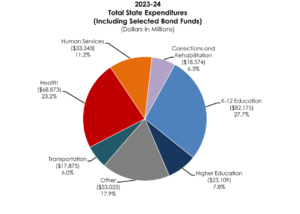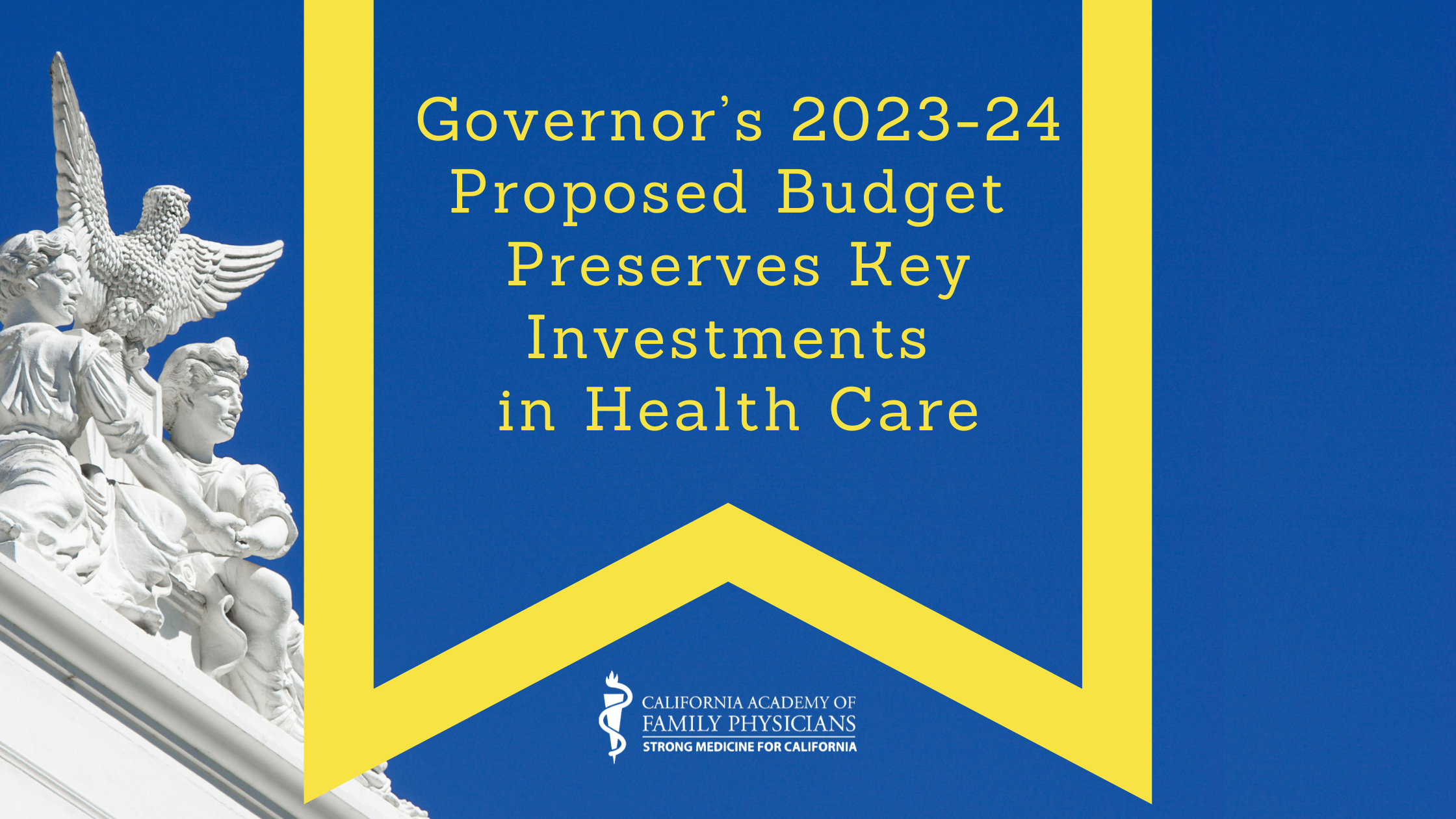Governor Gavin Newsom released his 2023-24 Budget Proposal on Tuesday, January 10, 2023. Despite a projected budget deficit, the budget proposal preserves key investments in recent budgets to advance state priorities and values, including making healthcare affordable and accessible, regardless of immigration status, and investing in the primary care workforce by maintaining Song-Brown funding. The 2023-24 Governor’s Budget proposes spending of $296.9 billion in total state funds, consisting of approximately $223.6 billion from the General Fund, $70.4 billion from special funds, and $2.9 billion from bond funds. 23.2 percent of total state expenditures is dedicated to health-related expenditures.

The 2023-24 budget includes:
- Primary Care Rate Increases - The Budget includes $22.7 million ($8.6 million General Fund) in 2023-24 and $57.1 million ($21.7 million General Fund) ongoing for primary care and obstetric care provider increases. The Administration will continue to evaluate the need for additional targeted provider rate increases at the May Revision.
- Medi-Cal Expansion - The Budget maintains $844.5 million ($635.3 million General Fund) in 2023-24, $2.1 billion ($1.6 billion General Fund) in 2024-25, and approximately $2.5 billion ($2 billion General Fund) ongoing, inclusive of In-Home Supportive Services costs, to expand full-scope Medi-Cal eligibility to all income-eligible adults ages 26 to 49 regardless of immigration status on January 1, 2024.
- CalAIM - The Budget maintains the approximately $10 billion total funds commitment to continue transforming the health care delivery system through California Advancing and Innovating Medi-Cal (CalAIM).
- Behavioral Health Continuum - The Budget maintains over $8 billion total funds across various Health and Human Services departments to expand the continuum of behavioral health treatment and infrastructure capacity and transform the system for providing behavioral health services to children and youth.
- Public Health Infrastructure Investment - The Budget maintains $300 million ongoing General Fund to modernize state and local public health infrastructure and transition to a resilient public health system. Of this amount, $100 million General Fund supports increased state public health capacity in foundational public health areas such as emergency preparedness and response and workforce development and training. The remaining $200 million General Fund is for local health jurisdictions to expand public health staffing and reduce health disparities.
- Healthcare Workforce - The Budget maintains over $1 billion General Fund to the Department of Health Care Access and Information (HCAI) to strengthen and expand the state’s health and human services workforce. These investments include funding for increasing nurses, community health workers and social workers, and supporting new individuals coming into the workforce in behavioral health, primary care, and reproductive health. This commitment will be fulfilled, but over more time due to declining General Fund revenues.
- Reproductive Health Services - The Budget includes $200 million ($15 million General Fund) in 2024-25 for a grant program focused on supporting access to family planning and related services, system transformation, capacity, and sustainability of California’s safety net. This funding builds on the 2022 Budget Act investments for reproductive health services and continues California’s progress to provide comprehensive family planning and related services as California grapples with the effects of recent federal actions.
- Emergency Response and SMARTER Plan Implementation - The Budget reflects $176.6 million General Fund in 2023-24 to continue the state’s efforts to protect the public’s health against COVID-19, consistent with the Administration’s SMARTER Plan, and maintain significant information technology systems, including the California COVID Reporting System for laboratory data management and CalCONNECT for case and outbreak investigation.
- Opioid and Fentanyl Response - The Budget includes an additional $93 million in Opioid Settlement Funds over four years beginning in 2023-24 to support youth- and fentanyl-focused investments for the Department of Health Care Services and for the Department of Public Health as follows:
- $79 million for the Naloxone Distribution Project to increase distribution to first responders, law enforcement, community-based organizations, and county agencies.
- $10 million for fentanyl program grants to increase local efforts in education, testing, recovery, and support services.
- $4 million to support innovative approaches to make fentanyl test strips and naloxone more widely available.
- Federal Public Health Emergency Extension - The Budget assumes a two-quarter extension of the federal Public Health Emergency through mid-April 2023 and enhanced federal funding through the end of the 2022-23 fiscal year.
Budget Shortfall:
The Governor’s Budget forecasts that General Fund revenues will be $29.5 billion below the 2022 Budget Act projections, and California now faces an estimated budget gap of $22.5 billion in the 2023-24 fiscal year. The Governor’s Budget does not propose to draw from the State’s reserve accounts to close the budget gap. Rather, to close the budget gap, the State will be focusing on one-time and near-term spending instead of costly long-term obligations; tying or “triggering” a handful of new ongoing programs to sufficient revenue availability in 2024-25 ($3.9 billion); implementing funding delays ($7.4 billion), reductions and “pullbacks” ($5.7 billion), and fund shifts ($4.3 billion); and limited revenue generation and borrowing ($1.2 billion). If, however, economic and revenue conditions deteriorate in the spring, then the Administration may propose withdrawals from reserve accounts, as well as additional program reductions. Some of proposed solutions to the budget shortfall include:
- Managed Care Organization Tax - The Budget proposes the renewal of the Managed Care Organization (MCO) Tax effective January 1, 2024, through December 31, 2026, to help maintain Medi-Cal program funding for the Medi-Cal expansion to all income eligible individuals and minimize the need for reductions to the program. The Administration will explore opportunities over the next few months to increase the MCO Tax to provide support for the Medi-Cal program.
- Partial Public Health Workforce Reductions - The Budget reduces funding for various public health workforce training and development programs by $49.8 million General Fund over four years to help address the budgetary problem.
- Workforce Funding Delays - The Budget defers $68 million in 2022-23 and $329.4 million in 2023-24 for certain HCAI healthcare workforce programs, including for nursing initiatives, community health worker, and social workers. These programs remain fully funded, but these funds will be appropriated later than initially anticipated—$198.7 million in both 2024-25 and 2025-26.
- Behavioral Health Continuum Infrastructure Program Delays - The Budget delays the last round of behavioral health continuum capacity funding of $480.7 million General Fund appropriated in the 2022 Budget Act for 2022-23 to $240.4 million in 2024-25 and $240.3 million in 2025-26. A total of $1.2 billion has been awarded to date, and the Budget maintains $480 million General Fund for crisis and behavioral health continuum grant funding to be awarded in 2022-23.
- Covered California Subsidy Transfers - Last year, the Budget provided a contingency in case federal subsidies were not extended for Health Care Marketplaces, including Covered California. Federal subsidies were extended until 2025, so the contingency was placed in the Health Care Affordability Reserve Fund (HCARF) to ensure that state-only premium subsidies are available again in the future when they are most needed. Due to declining General Fund revenues, the Budget transfers the available HCARF balance of $333.4 million to the General Fund. These funds will be returned after federal subsidies end, which is scheduled in 2025-26.
CAFP will work with legislative offices and allies to support the Governor’s proposals to expand and improve health care in California. CAFP will also continue to work with the Administration and the Legislature to ensure California further builds the primary care physician workforce.

